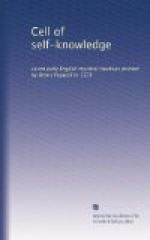of vain thoughts, be first refrained, without doubt
the lust of the sensuality may not be attempered.
And therefore who so will abstain him from fleshly
and worldly lusts, him behoveth first seldom or never
think any vain thoughts.[72] And also never in this
life may a man perfectly despise the ease of the flesh,
and not dread the disease, but if he have before busily
beholden the meeds and the torments that are to come.
But here it is to wete how that, with these four sons
of these two maidens, the city of our conscience is
kept wonderfully from all temptations. For all
temptation either it riseth within by thought, or else
without by some of our five wits. But within
shall Dan deem and damn evil thoughts by sight of
pain; and without shall Gad put against[73] false
delights by use of abstinence. Dan waketh[74]
within, and Gad without; and also their other two
brethren helpen them full much: Naphtali maketh
peace within with Dan, and Asher biddeth Gad have no
dread of his enemies. Dan feareth the heart with
ugsomeness of hell, and Naphtali cherisheth it with
behighting[75] of heavenly bliss. Also Asher
helpeth his brother without, so that, through them
both, the wall of the city is not broken. Gad
holdeth out ease, and Asher pursueth disease.
Asher soon deceiveth his enemy, when he bringeth to
mind the patience of his father[76] and the behighting
of Naphtali, and thus oft times ever the more enemies
he hath, the more matter he hath of overcoming.
And therefore it is that, when he hath overcome his
enemies (that is to say, the adversities of this world),
soon he turneth him to his brother Gad to help to destroy
his enemies. And without fail, from that he be
come, soon they turn the back, and flee. The
enemies of Gad are fleshly delights; but truly, from
the time that a man have patience in the pain of his
abstinence, false delights find no woning stead[77]
in him.
CAPITULUM VII
HOW JOY OF INWARD SWEETNESS RISETH IN THE AFFECTION
Thus when the enemy fleeth and the city is peased,[78]
then beginneth a man to prove what the high peace
of God is that passeth man’s wit. And therefore
it is that Leah left bearing of children unto this
time that Gad and Asher were born of Zilpah, her maiden.
For truly, but if it be so that a man have refrained
the lust and the pain of his five wits in his sensuality
by abstinence and patience, he shall never feel inward
sweetness and true joy in God and ghostly things in
the affection. This is that Issachar, the fifth
son of Leah, the which in the story is cleped “Meed."[79]
[And well is this joy of inward sweetness cleped “meed"];[80]
for this joy is the taste of heavenly bliss, the which
is the endless meed of a devout soul, beginning here.
Leah, in the birth of this child, said: “God
hath given me meed, for that I have given my maiden
to my husband in bearing of children."[81] And so
it is good that we make our sensuality bear fruit




